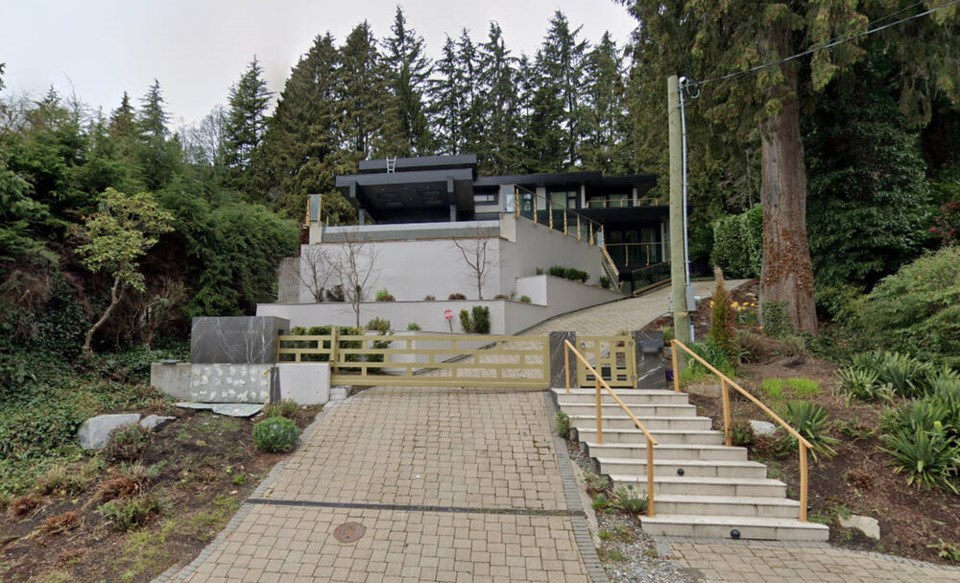A West Vancouver property developer has been ordered to pay a client more than $1 million after botching the completion of a new home sale.
According to a B.C. Supreme Court ruling released this week, in October 2018, Zihao Yan, also known as Tony Yan, agreed to purchase the property at 3151 Benbow Rd. from Benbow Residences Inc., the company that was building a new home on the land, for $5.38 million.
Yan’s property inspector produced a list of 43 deficiencies which Benbow Residences Inc agreed to fix and Yan put down a $1-million deposit. The contract required the defendant to deliver the land title free and clear of charges, including any mortgages, for completion of the sale, and the municipal occupancy permit had to be in place.
Yan was out of town for the next several months and found things in a worse state when he came home.
“When Mr. Yan returned from China, not only were many of the deficiencies not fixed, but the property was in a state of upheaval. For example, the driveway was dug up and was unusable, there was no working boiler to heat the pool and hot tub, the smart controls in the home did not work, the security system did not work, and the patio doors did not close,” B.C. Supreme Court Justice Sandra Sukstorf wrote, adding that Yan was forced to live with his father while the work continued. “A similar state of affairs continued until late October 2019.”
On Oct. 29, 2019, one day before the completion date, Yan received another inspection report that found “many of the deficiencies and construction items had not been completed.”
The occupancy permit the defendant’s lawyer provided was for another property entirely, the ruling states, and rather than delivering a free and clear property title, there were multiple existing mortgages and liens registered against the property.
Yan’s lawyer sent a letter saying he considered they contract to be “repudiated” and requested the $1 million back.
“The deposit was not returned,” the ruling states.
Yan then sued, and Phil Garrow, Benbow Residences’ principal and president, countersued.
In the lead up to the trial, the defendant failed to turn over documents, as ordered by the court, and also failed to show up for several key dates, including the trial itself, Sukstorf noted.
Ultimately, Sukstorf determined the trial should go ahead without Garrow or any lawyer representing Benbow Residences present.
“The defendant’s non-attendance appears to be a continuation of his pattern of non-compliance rather than an isolated incident,” she wrote.
Benbow’s failure to complete the construction, combined with the lack of an occupancy permit, fundamentally deprived Yan of the benefits he was entitled to under the contract, Sukstorf found.
“If these obligations are not considered to be fundamental, Mr. Yan would be forced to accept a property that is uninhabitable and non-compliant with municipal regulations. This would be commercially unreasonable,” she wrote.
She reached a similar conclusion about Benbow Residences’ unwillingness or inability to deliver the property with a clear title.
“The presence of multiple third-party mortgages and liens on the property at the time of completion exposed Mr. Yan to legal risk, including potential foreclosure and disputes with creditors. The risk was not speculative as foreclosure proceedings related to those mortgages did subsequently materialize,” she wrote, ultimately ordering Benbow Residences Inc. to return the $1 million deposit, plus interest, while also tossing out the counterclaim.
“In the event of difficulty in recovering the $1 million, Mr. Yan may apply for such further relief as is necessary on notice to the defendant,” the ruling concludes.
Yan also asked the court to award him unspecified special costs in the case, which the courts will consider “where there is conduct on the part of a litigant that is deserving of the court’s rebuke.”
Sukstorf agreed.
“The defendant has engaged in behaviour that significantly disrupted the proceedings and increased Mr. Yan’s legal expenses,” the judge wrote, adding that doing so prejudiced Yan’s case and burdened the court system by having to intervene to enforce basic procedural requirements. “In my view, the defendant’s repeated failure to comply with court orders, despite receiving clear instructions and multiple opportunities to do so, demonstrates a consistent disregard for the court’s authority that is deserving of rebuke.”





